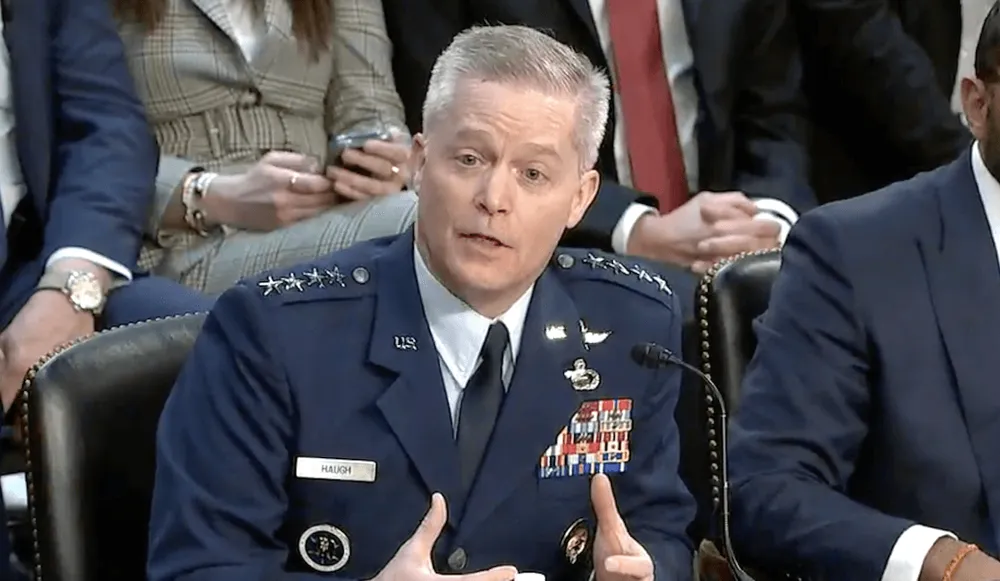Haugh fired from leadership of NSA, Cyber Command
President Donald Trump on Thursday fired Air Force Gen. Timothy Haugh as the head of U.S. Cyber Command and the National Security Agency, a move that could have lasting consequences for national security.
The ouster of Haugh, who was only a little over a year into what is traditionally a three-year term, could be the start of even greater changes to the military’s top digital warfighting organization and the world’s largest spy agency.
In addition to Haugh, Wendy Noble, an NSA veteran who was named the agency’s deputy chief in 2023, was transferred to a post in the Pentagon’s Office of the Under Secretary of Defense for Intelligence, according to four sources familiar with the matter.
Cyber Command and NSA personnel were informed late Thursday night that Army Lt. Gen. William Hartman, the No. 2 at Cyber Command, would assume leadership of both organizations in an acting capacity, one of these sources said.
Sheila Thomas, the NSA’s executive director, will replace Noble, according to another source.
The reasoning behind the move was initially unclear. Early Friday morning, Laura Loomer, — a far-right activist who once claimed the Sept. 11 terrorist attacks were an inside job and reportedly met with the president this week — claimed credit for prompting the moves, as well as the axing of several National Security Council officials.
"As a Biden appointee, General Haugh had no place serving in the Trump admin given the fact that he was HAND PICKED by General Milley, who was accused of committing treason by President Trump," she wrote in a post on X. "Why would we want an NSA Director who was referred to Biden after being hand selected by Milley, who told China he would side with them over Trump."
The Pentagon said it would provide more information when it becomes available.
The changes mark the latest upheaval to jolt the U.S. national security apparatus. President Trump in February fired Air Force Gen. CQ Brown Jr. as chairman of the Joint Chiefs of Staff. And Defense Secretary Pete Hegseth has sought to cut tens of thousands of jobs from DOD’s payroll to put the money toward the president’s priorities.
By removing Haugh, Trump could be readying to split the “dual-hat” leadership structure that has governed both entities for more than a decade. Trump nearly severed the connection at the end of his first term, and people connected to his transition said he would attempt to do so again once back in office.
If that is the case, Trump could name a new Cyber Command chief and separately a new head of the powerful espionage agency.
Or the president could just be looking to install his own pick atop both organizations.
Jon Darby, NSA’s former director of operations, blasted the dismissals.
"No matter if this move is for a perceived lack of loyalty or is a precursor for splitting the dual hat, removing seasoned leaders with the depth of knowledge in the extremely complex world of cyber and signals intelligence is dangerous to the nation,” he said.
In a statement, Mark Warner of Virginia, the top Democrat on the Senate Intelligence Committee, also derided Haugh’s firing.
“At a time when the United States is facing unprecedented cyber threats, as the Salt Typhoon cyberattack from China has so clearly underscored, how does firing [Haugh] make Americans any safer?“
He also said it is “astonishing” Trump would “fire the nonpartisan, experienced leader of the National Security Agency while still failing to hold any member of his team accountable for leaking classified information on a commercial messaging app,” a reference to the Cabinet-level discussion of pending military strikes on Signal.
Martin Matishak
is the senior cybersecurity reporter for The Record. Prior to joining Recorded Future News in 2021, he spent more than five years at Politico, where he covered digital and national security developments across Capitol Hill, the Pentagon and the U.S. intelligence community. He previously was a reporter at The Hill, National Journal Group and Inside Washington Publishers.



